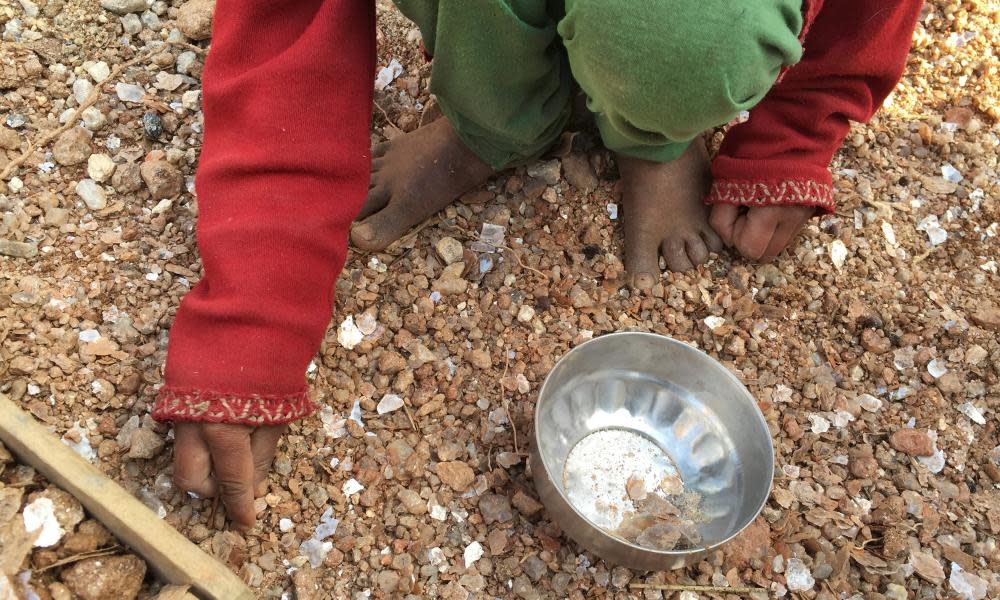Major car paint suppliers join initiative against child labour in mica mines

PPG and Axalta, two of the world’s largest car paint suppliers, have joined a global initiative to purge child labour from the mica industry after a Guardian investigation linked child labour in their supply chains to Vauxhall, Volkswagen and BMW.
Although largely unknown to consumers, mica is one of the most widely used minerals globally, highly valued for its ability to reflect and refract light and found in a multitude of different products and industries.
Roughly 25% of the world’s mica is mined in the impoverished Indian states of Jharkhand and Bihar, with an estimated 20,000 children engaged in illegal mines.
The cosmetics industry has faced sustained criticism over its continued use of natural mica from Indian mines to produce makeup sold to global consumers.
Last July, a Guardian report that revealed links between child labour and major car paint suppliers prompted car brands including Vauxhall, Volkswagen and BMW to launch investigations into their supply chains.
PPG and Axalta have now joined the Responsible Mica Initiative, already supported by cosmetics multinationals L’Oreál, Chanel, Estée Lauder, as well as major mica-sourcing companies including Merck and Chinese-owned Fujian Kuncai. The initiative pledges to eliminate child labour from mica production by 2022.
The scheme marks the first comprehensive approach to tackling endemic child labour in mica mining since the industry was alerted to its existence more than a decade ago. Its aims are to implement fair and sustainable collection, processing and sourcing practices throughout the mica supply chain and improve traceability; to scale up current social empowerment programmes in villages; and to cooperate with Indian authorities in building a legal framework for mica communities.
No car brand is yet to join the initiative. Vauxhall, VW and BMW told the Guardian that they have declined to participate.
Following the report last year, all car companies launched internal investigations, which led to BMW and VW suspending some relationships with suppliers in India.
In a statement, Vauxhall (part of GM group) declined to specify what actions it had taken but said it was now satisfied that its suppliers had taken adequate steps to address the issue of child labour.
“Based on GM’s review and ongoing compliance activities with the paint suppliers identified in the Guardian’s article, it appears that these suppliers have deployed safeguards, and are continuing to audit and take steps, to comply with GM’s zero-tolerance policy against the use of child labour,” the company said in a statement.
BMW said that it had halted purchases of Indian mica until its suppliers could guarantee that their supply chains were free from child labour.
“The BMW Group welcomes the fact that this [unnamed] paint supplier and its tier-two supplier have joined other companies in the Responsible Mica Initiative,” said Kai Zöbelein, sustainability spokesperson for BMW Group.
India officially produced about 12,500 tons of mica in 2014-15, while it exported more than ten times as much, about 140,000 tons, according to new data from the ministry of mines (pdf). The state of Jharkhand officially produced no mica at all in 2014-15, even though mining takes place there in hundreds of small-scale illegal mines.
The Responsible Mica Initiative aims to eradicate not only child labour but also unacceptable working conditions in the Indian mica supply chain. This would potentially include widespread debt bondage in the illegal mica mines, also identified in the Guardian’s investigation.

Catherine Peyreaud, director at Natural Resource Stewardship Circle, a sustainable sourcing company that co-founded the Responsible Mica Initiative. She said it was vital that brands as well as suppliers participate.
“Brands cannot let their suppliers tackle this issue alone. It is a shared responsibility to make this supply chain sustainable,” she said.
Welcoming the initiative as a very positive step to eradicate child labour, the director of Anti-Slavery International, Aidan McQuade, said: “To tackle underlying causes and contributors to child labour, debt bondage of adult workers in the industry must also be addressed. It’s important to ensure decent working conditions and living wages for parents, to reduce pressure on households for children to work.”

 Yahoo News
Yahoo News 
